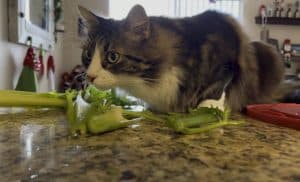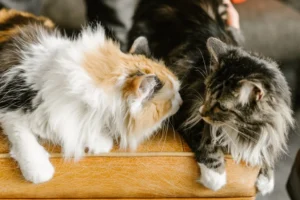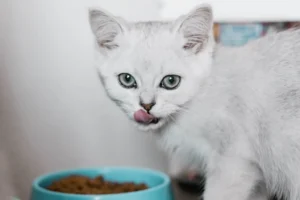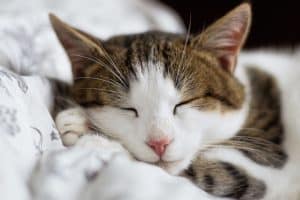Are you curious about why cats are given catnip? Let’s explore the fascinating reasons behind this common practice.
Cats are given catnip for its unique effects on their behavior and well-being. So, why exactly are cats given catnip? Let’s find out below:
What is Catnip and How Does it Affect Cats?
Catnip is like a magical herb for our feline friends. This plant, scientifically known as Nepeta cataria, contains a compound called nepetalactone that triggers a unique response in cats. When cats sniff or consume catnip, it binds to receptors in their nasal tissue, sending signals to the brain that result in the typical catnip response.
The effects of catnip can vary from cat to cat, but common behaviors include rolling, rubbing, purring, and overall goofiness. It’s like watching your cat tap into their inner wild side! These reactions usually last for about 10-15 minutes, after which they gradually diminish as the effects wear off.
Catnip isn’t harmful to cats and is completely safe for them to enjoy. It can provide enrichment and stimulation, serving as a fun treat for your furry companion. So, the next time you see your cat going crazy over that catnip toy, just know they’re having a blast in their own little world!
The Science Behind Catnip: Why Do Cats React the Way They Do?
Have you ever wondered why cats seem to go bonkers for catnip? Well, it all comes down to how their brains are wired. When a cat encounters catnip, the nepetalactone in the plant binds to receptors in their sensory neurons, triggering a cascade of neurotransmitters that ultimately lead to those wild reactions.
Interestingly, not all cats are affected by catnip. It’s estimated around 50-70% of cats have a genetic predisposition to respond to catnip, while others show little to no reaction at all. So, if your cat goes crazy for catnip, consider them part of the lucky club!
The sensitivity to catnip is hereditary, so if you’ve got a cat that goes nuts for the stuff, they likely inherited that trait from their parents. It’s like having a family secret, but instead of passing down a prized recipe, it’s passing down a love for catnip-induced shenanigans!
Is Catnip Safe for Cats?
Catnip is generally considered safe for cats and is often used as a form of enrichment for our feline friends. When cats interact with catnip, they may exhibit playful behaviors, such as rolling around, rubbing their faces on it, or even becoming more vocal. It’s important to note that not all cats are affected by catnip, as sensitivity to it is actually hereditary.
Some cats may not respond to catnip at all, and this is completely normal. It’s estimated that around 30-50% of cats do not possess the genetic trait that makes them sensitive to catnip. So, if you offer your cat a catnip toy and they don’t seem interested, there’s no need to worry – they simply may not have the genetic predisposition to enjoy it.
As with any substance, it’s essential to use catnip in moderation. While catnip itself is not toxic to cats, giving them too much can lead to an upset stomach or temporary behavioral changes. So, be sure to monitor your cat’s reactions and use catnip as a fun occasional treat for them to enjoy. Just remember, always consult with your veterinarian if you have any concerns about your cat’s behavior or health.
Tip: Always supervise your cat when they are playing with catnip to ensure they are using it safely and not ingesting too much of the plant.
Catnip Sensitivity: Why Do Some Cats Not Respond to Catnip?
Have you ever noticed that some cats go wild for catnip while others seem completely indifferent to it? This variation in sensitivity to catnip is actually linked to genetics. Cats have an inherited gene that determines whether or not they will respond to catnip, and it’s estimated that this trait is passed down from their parents.
Essentially, if a cat inherits the gene that makes them sensitive to catnip, they will likely exhibit the typical playful behaviors when exposed to the plant. On the other hand, if a cat does not inherit this gene, they simply won’t be affected by catnip in the same way. It’s fascinating to see how genetics play such a significant role in determining our cats’ reactions to certain stimuli like catnip.
So, if your cat falls into the category of non-responders, don’t worry – they are perfectly normal. They might just have different preferences when it comes to enrichment activities. Pay attention to what other toys or activities they enjoy, and cater to their individual preferences to keep them happy and entertained.
Remember, every cat is unique, and what works for one may not work for another. Celebrate your cat’s individuality and find ways to keep them stimulated and engaged that align with their specific likes and dislikes. Your furry friend will thank you for it!
Alternatives to Catnip: What Can You Give Your Cat Instead?
If your kitty isn’t a fan of catnip or you’re looking for other ways to enrich their playtime, there are plenty of alternatives to consider. Silver vine and valerian root are two popular options that can spark a similar reaction in cats. Honeysuckle is another great choice that some felines find irresistible. Toys filled with organic catnip oil or sprays can also provide a fun and stimulating experience for your furry friend. Remember, every cat is unique, so it may take some trial and error to find what your cat responds to best!
Catnip for Kittens: Is it Safe for Young Cats?
Introducing catnip to kittens can be a fun and safe experience, as long as they are at least three months old. Young cats are less likely to respond to catnip compared to older cats, and their sensitivity to it may vary. While catnip is generally considered safe, it’s good to monitor your kitten’s reaction the first time they encounter it. Some kittens may not show any interest until they are a few months older, so don’t be discouraged if your little one isn’t immediately captivated. Just like with adult cats, always use catnip in moderation to prevent overstimulation.
Growing Your Own Catnip: A Fun Way to Provide Enrichment for Your Cat
Want to treat your furry friend to a delightful experience? Growing your own catnip could be just the thing! Not only is it a cost-effective way to provide enrichment for your cat, but it’s also a fun and rewarding activity for you. Catnip plants are relatively easy to grow, requiring minimal effort and space. By cultivating catnip at home, you can ensure a fresh and potent source of this feline favorite whenever your cat needs a pick-me-up.
To get started, all you need is a sunny spot in your garden or a small pot near a window. Catnip seeds or starter plants can be easily found at your local nursery or garden center. Once planted, catnip typically thrives with regular watering and minimal maintenance, making it an ideal addition to any home garden. Watching your catnip plant grow and flourish can be a rewarding experience, knowing that you’re providing your cat with a natural and safe source of enjoyment.
So why not try your hand at growing catnip? Not only will you be providing enrichment for your cat, but you’ll also have a delightful herb to enjoy in your own recipes or teas.
Benefits of Growing Your Own Catnip:
- Cost-effective: Saves money on buying expensive catnip products.
- Fresh and potent: Provides a high-quality source of catnip for your cat.
- Easy and rewarding: A fun gardening project that benefits both you and your feline friend.
Fun Facts About Catnip: Surprising Tidbits You Didn’t Know
Did you know that catnip is not just for cats? This fascinating herb has a long history of use in human cultures as well, valued for its medicinal properties and unique aroma. Catnip belongs to the mint family and contains a compound called nepetalactone, which is responsible for its effects on cats. Interestingly, only about 50% to 70% of cats are affected by catnip, with kittens and older cats showing less sensitivity to its effects.
Another fun fact about catnip is that it can have the opposite effect on cats, causing them to become more relaxed and sedated. This tranquilizing effect may be more pronounced when catnip is ingested rather than sniffed, leading to a calm and contented kitty.
So the next time you offer your cat a sprinkle of catnip, remember these surprising tidbits about this magical herb. Who knew there was so much more to catnip than just a playful reaction from your feline friend?
Alex, a passionate animal lover, has experience in training and understanding animal behavior. As a proud pet parent to two dogs and three cats, he founded AnimalReport.net to share insights from animal experts and expand his knowledge of the animal kingdom.









